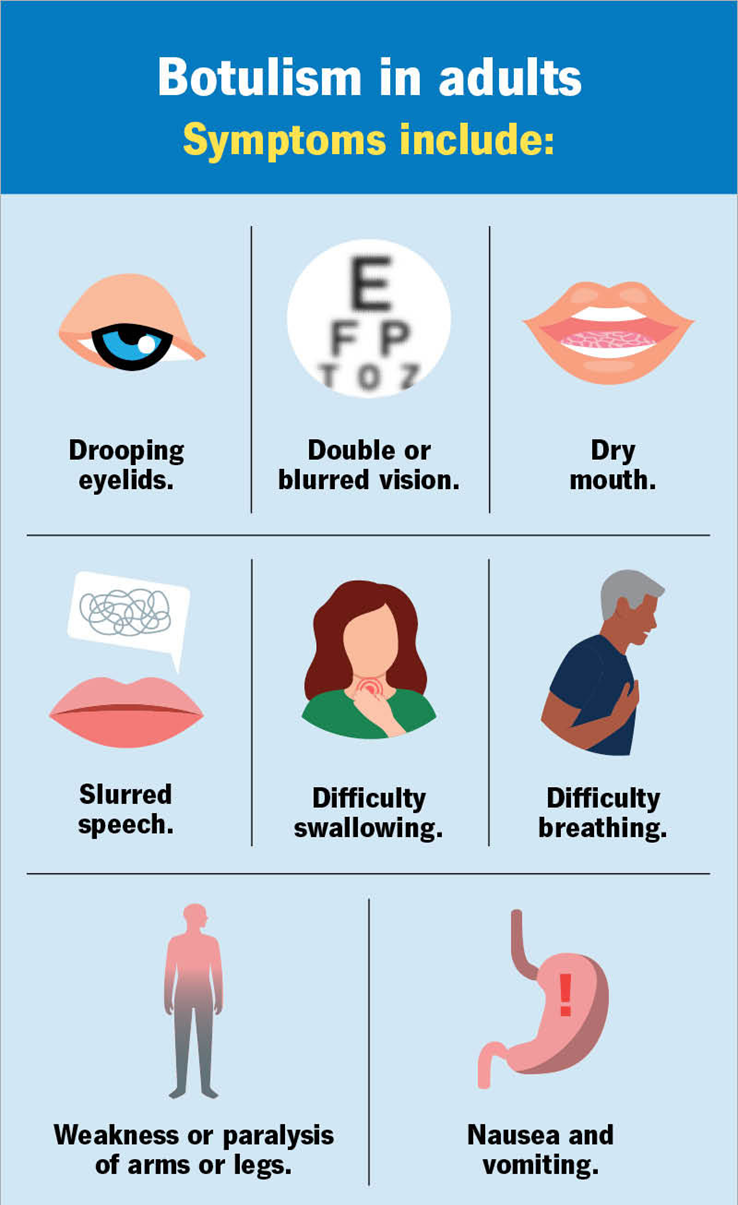A nurse is preparing a response protocol for botulism as a bioterrorism agent. The nurse should prepare the protocol based on which of the following information? (Select all that apply.)
Botulism is acquired through direct contact with an infected person.
Notify the Centers for Disease Control and Prevention (CDC) when more than three cases are confirmed.
Botulism can produce paralysis within 12 to 72 hours following exposure.
Vomiting and diarrhea are expected findings following exposure.
Botulism is a toxin found in castor beans.
Correct Answer : C,D
Choice A reason: Botulism is Acquired Through Direct Contact with an Infected Person
Botulism is not acquired through direct contact with an infected person. It is caused by a toxin produced by the bacterium Clostridium botulinum. The most common forms of botulism are foodborne, wound, and infant botulism. Foodborne botulism occurs when a person ingests food containing the toxin, while wound botulism occurs when the bacteria infect a wound and produce the toxin. Infant botulism occurs when infants ingest spores of the bacteria, which then grow and produce the toxin in their intestines.
Choice B reason: Notify the Centers for Disease Control and Prevention (CDC) When More Than Three Cases Are Confirmed
While notifying the CDC is crucial in the event of a botulism outbreak, the specific threshold for notification can vary. Generally, any suspected case of botulism should be reported to public health authorities immediately due to the severity of the disease and the potential for outbreaks. The CDC provides guidelines for reporting and managing botulism cases.
Choice C reason: Botulism Can Produce Paralysis Within 12 to 72 Hours Following Exposure
Botulism can indeed produce paralysis within 12 to 72 hours following exposure. The toxin affects the nervous system, leading to muscle paralysis. Early symptoms include weakness, dizziness, and dry mouth, followed by more severe symptoms such as blurred vision, difficulty swallowing, and muscle weakness. If left untreated, botulism can lead to respiratory failure and death.
Choice D reason: Vomiting and Diarrhea Are Expected Findings Following Exposure
Vomiting and diarrhea may occur early, especially in foodborne or inhalational exposures, before neurologic signs appear
Choice E reason: Botulism is a Toxin Found in Castor Beans
Botulism is not a toxin found in castor beans. The toxin found in castor beans is ricin, which is a different type of bioterrorism agent. Botulism is caused by the botulinum toxin produced by Clostridium botulinum bacteria.

Nursing Test Bank
Naxlex Comprehensive Predictor Exams
Related Questions
Correct Answer is D
Explanation
Choice A reason:
Family history of cardiac disease is a non-modifiable risk factor. This means it cannot be changed or controlled through lifestyle or behavioral modifications. A family history of heart disease increases an individual’s risk, but it is not something that can be altered.
Choice B reason:
Increasing age is another non-modifiable risk factor. As people age, their risk for cardiovascular disease naturally increases. This is due to the cumulative effects of aging on the cardiovascular system, which cannot be changed.
Choice C reason:
The diagnosis of diabetes mellitus is a complex risk factor. While the presence of diabetes itself is not modifiable, the management of diabetes through lifestyle changes, medication, and diet can significantly reduce cardiovascular risk. However, the condition itself remains a non-modifiable risk factor.
Choice D reason:
Cigarette smoking is a modifiable risk factor. This means that individuals can reduce their risk of cardiovascular disease by quitting smoking. Smoking cessation has been shown to significantly lower the risk of heart disease and improve overall cardiovascular health.
Correct Answer is []
Explanation
The correct answers are:
Condition:
- a. Pneumothorax
(After a thoracotomy and chest tube insertion, pneumothorax is a potential complication as air can accumulate in the pleural space, compromising lung expansion.)
Actions:
- b. Administer oxygen as prescribed.
(To ensure adequate oxygenation while resolving the pneumothorax) - b. Ensure the chest tube is functioning properly.
(Ensuring the chest tube is removing air from the pleural space to restore lung expansion)
Parameters to Monitor:
- c. Respiratory rate and effort.
(To assess the client's respiratory status and detect any changes indicating distress or worsening pneumothorax) - c. Oxygen saturation levels.
(To continuously assess oxygenation and detect any hypoxia)
Rationale:
A pneumothorax is more likely post-thoracotomy, especially with a chest tube insertion, as air is a primary concern in the pleural space. Monitoring respiratory parameters like oxygen saturation and respiratory effort helps evaluate the client's respiratory function and chest tube efficacy.
Whether you are a student looking to ace your exams or a practicing nurse seeking to enhance your expertise , our nursing education contents will empower you with the confidence and competence to make a difference in the lives of patients and become a respected leader in the healthcare field.
Visit Naxlex, invest in your future and unlock endless possibilities with our unparalleled nursing education contents today
Report Wrong Answer on the Current Question
Do you disagree with the answer? If yes, what is your expected answer? Explain.
Kindly be descriptive with the issue you are facing.
